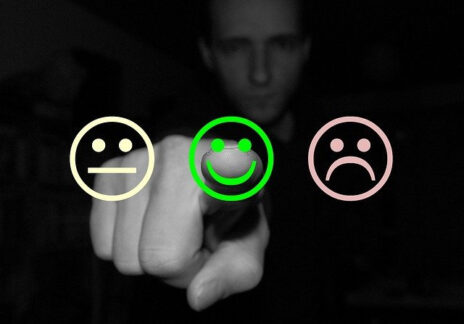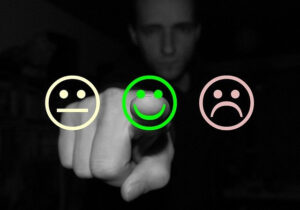How we judge other people – the contrast effect and other mechanisms


How we judge other people changes under the influence of many factors. An example is the contrast effect, i.e. the dependence of the evaluation of one element on comparison to other elements. For example, men who have seen photos of models evaluate the beauty of their wives worse than men who have not seen photos of models before (Feldman, 1992 as cited in: Tyszka, 1999).
This effect also works with various products, for example written essays, speeches, etc. An average school essay is rated worse if the teacher has read some good essays before than if he or she had several poor essays before reading the average one (Noizet, Caverni, 1988).
Our mood is also of great importance for our ratings. In a study by Forgas and Bower (1987), people who were in a good mood, when reading a description of a person, spent more time reading about the positive aspects of that person than about the negative ones, formulated more positive than negative evaluations about that person, and recalled more positive information about that person. It was quite the opposite in the case of people who read the same description while in a bad mood. They spent more time reading about the person’s negative qualities, recalled more of the person’s negative qualities, and formulated more negative than positive evaluations about this person.
We are also unable to be objective when we feel any emotion towards the person or persons we evaluate – when we like them or the contrary. Much research has been done on this subject, one of the first by Hastorf and Cantril (1954). They asked students from two universities to objectively evaluate the football match played by teams from the two universities. Students from both universities noticed more violations of the rules of the game in the team representing the opposing, not theirs, university, although in reality both teams were playing equally aggressively. In other studies (Vallone, Ross, & Lepper, 1985), three days before the presidential election, it was asked to determine whether the media devoted the same amount of time to both candidates. About a third of respondents said that the media was biased to the detriment of their candidate.
However, the lack of objectivity does not always mean favoring people to whom we have a positive emotional attitude. Research (Tesser & Campbell, 1982) has shown that we favor female friends over strangers in areas we do not consider important to ourselves. However, if the field is important to us, we evaluate our friend’s achievements in this area as lower than those of the stranger. We are happy to congratulate a friend on his/her success in an area we are not good at, but we will not want him/her to be good at what we are good at. It’s about maintaining your high self-esteem. If we are good at something, better than others, it makes a big difference to our self-esteem and a friend, if he becomes successful in the same field, may be perceived by us as a threat. If there is going to be someone better than us in our field, it is better if it is someone we do not know. It is different if a friend is good in an area where we do not know each other. Then we want him to do well and we highly appreciate his skills in this field, because thanks to this we can be proud of what a talented friend we have.
Our assessment may even be influenced by stimuli completely unrelated to the object we are assessing. The study by Bargh (1999) presented a recording of a conversation between two people. One group of respondents was told that it was an interview for the position of a waiter, and the other group was told the position of a crime-tracking journalist. At one point a third man appeared on the video and interrupted the conversation. Half of the respondents watched the video in which the man acted aggressively and firmly, and the other half got the video in which the man was nice and calm. The task of the respondents was to evaluate this third man. It turned out that how he was assessed depended on whether the respondents thought they were watching an interview for a waiter or a journalist. If they thought that the interview was about the waiter’s position, they rated the person who interrupted the interview more positively, if he behaved nice and calm. If, on the other hand, they thought the interview was about the reporter’s position, they judged the person better if he acted firmly and aggressively. Thus, the interview of two people influenced the assessment of the person who was in no way related to this interview. The respondents assessed this person as if they were assessing a candidate for a job. A polite and calm person would be better suited to the position of waiter, so the person who interrupted the conversation was rated positively when he behaved like this, and someone firm would be better suited to the position of a crime reporter, so another person would be rated better if he acted firmly. It may seem strange, but that’s how our minds work.
References
- Bargh, J. A. (1999). Automatyzmy dnia powszedniego. Czasopismo Psychologiczne, 5, 209-256.
- Forgas, J. P., Bower, H. G. (1987). Mood effects on person-perception judgments. Journal od Personality and Social Psychology, 53(1), 53-60.
- Hastorf, A. H., Cantril, H. (1954). They saw a game – a case study. Journal of Abnormal and Social Psychology, 49(1), 129-134.
- Noizet, G., Caverni, J. P. (1988). Psychologiczne aspekty oceniania osiągnięć szkolnych. Warszawa: PWN.
- Tesser, A., Campbell, J. (1982). Self-evaluation maintenance and the perception of friends and strangers. Journal of Personality, 50(3), 261-279.
- Tyszka, T. (1999). Psychologiczne pułapki oceniania i podejmowania decyzji. Gdańsk: Gdańskie Wydawnictwo Psychologiczne.
- Vallone, R. P., Ross, L., Lepper, M. R. (1985). The hostile media phenomenon: Biased perception and perceptions of media bias in coverage of the Beirut massacre. Journal of Personality and Social Psychology, 49(3), 577-585.
Author: Maja Kochanowska






Add comment